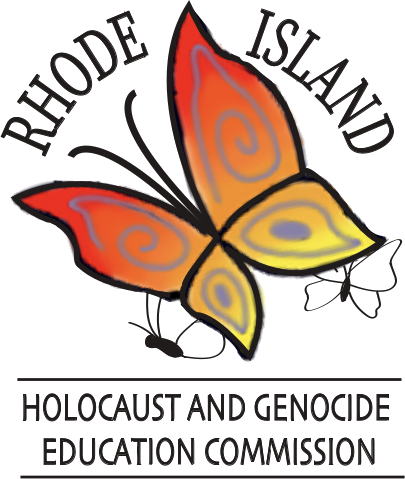 PROVIDENCE, R.I.—The Rhode Island Holocaust and Genocide Education Commission (RIHGEC) is kicking off its second annual April Holocaust and Genocide Awareness Month with a host of events planned across the state. As part of its mission to empower educators and their school communities to integrate learning about the Holocaust and other genocides as integral parts of their school cultures and studies, the commission also oversees the month of awareness by providing resources and professional development for teachers to incorporate these topics into their curricula.
PROVIDENCE, R.I.—The Rhode Island Holocaust and Genocide Education Commission (RIHGEC) is kicking off its second annual April Holocaust and Genocide Awareness Month with a host of events planned across the state. As part of its mission to empower educators and their school communities to integrate learning about the Holocaust and other genocides as integral parts of their school cultures and studies, the commission also oversees the month of awareness by providing resources and professional development for teachers to incorporate these topics into their curricula.
Holocaust and Genocide Awareness Month will commence on Monday, April 1, 2024 at 6 p.m. with a program entitled, “A.I., Truth and Genocide Denialism: Professional Development for a New Age,” sponsored jointly by the Genocide Education Project (GenEd), RI Holocaust and Genocide Education Commission and Sandra Bornstein Holocaust Education Center.
Genocide denialism is a growing movement, especially with regards to the Holocaust and the Armenian Genocide. Artificial intelligence (A.I.) has the potential to make denial seem more authentic, especially to students, who are already engaging with generative A.I.
Professor Michael Xiarhos of Salve Regina University and GenEd Teacher Fellow will present this timely workshop on emerging A.I, how it can spread denialism and how educators can separate fact from fiction.
The event will be held at Dwares JCC, 401 Elmgrove Ave., Providence, RI 02906. Register here. Light refreshments will be served.
Rounding off the month of events is “Remembrance, Resilience and Renewal: Genocide Awareness through the Arts,” on Sunday, April 28, 2024 at 2:30 p.m. at Sapinsley Hall at Rhode Island College, 600 Mt. Pleasant Ave., Providence, RI 02908. The program is presented and curated by artistic director and pianist Judith Lynn Stillman, Rhode Island College’s Artist-in-Residence.
Remembering the Cambodian, Rwandan, Liberian, Armenian and Uighur Genocides and the Holocaust, this multidisciplinary program embraces the music, art, spoken word and dance of four extraordinary and resilient cultures that have faced the scourge of genocide.
The program will feature Stillman, along with Anush Avetisyan, Becky Bass, Shani Achille-Collins, Joe Bentley, Michael De Quattro, lan Greitzer, Song Heng, Mher Khachatryan, Michael Laurendeau, Nuné Melik, Bryan Round, Willine Thoe and Alexander Tum. Tickets may be reserved here.
In addition to the aforementioned events, several presentations are being offered throughout the month of April at libraries across the state. An updated list of these presentations appears on the RIHGEC website.
The Ten Stages of Genocide and How Antisemitism Became an Effective Tool of the Nazis, presented by Barbara Wahlberg
This 75-minute presentation will explore the 10 Stages of Genocide, as defined by Genocide Watch, the origin of the term genocide coined by Raphael Lemkin and the history of antisemitism through the centuries, up to the 20th century and Nazi Europe.
- Wednesday, April 10 at 4:00 p.m. at Willett Free Library (45 Ferry Rd., Saunderstown, RI 02874)
- Thursday, April 25 at 5:30 p.m. at Newport Public Library (300 Spring St., Newport, RI 02840)
America and the Holocaust: Jim Crow Laws, Eugenics and the March Toward Genocide in Nazi-Occupied Europe, presented by Barbara Wahlberg
This 75-minute presentation provides a case study examining Nazi Germany and the United States during the 1930s, at a time when racism and eugenics were enshrined in law and practice. It will examine the national and historical contexts in which racism manifested in the two countries and explore how the pseudoscience of eugenics, as well as concerns about “racial purity,” found their way into the laws of the United States and Nazi Germany.
- Tuesday, April 9 at 6:30 p.m. at Tiverton Public Library (34 Roosevelt Ave., Tiverton, RI 02878)
- Tuesday, April 23 at 6:30 p.m. at Cumberland Public Library (1464 Diamond Hill Rd., Cumberland, RI 02869)
- Monday, April 29 at 6:00 p.m. at Harmony Library (195 Putnam Pike, Harmony, RI 02814)
A Journey from Despair to Hope: The Armenian Genocide and the Story of the Armenian Americans of RI, presented by Pauline Getzoyan and Esther Kalajian
Under the cover of World War I, Armenians of the Ottoman Empire became the victims of the first modern genocide. The Armenian Genocide, carried out by the Ottoman Turks, has been denied by the perpetrators to this day. The video, “A Journey from Despair to Hope: The Story of the Armenian Americans of Rhode Island,” traces the story of Margaret Garabedian DerManuelian, a survivor of the Armenian Genocide, and her arrival in Rhode Island. The film, which will be a focal point of this 75-minute presentation, also introduces the history of the Armenian Genocide and illuminates the impact of genocide denial on future generations, as well as the impact of genocide on identity.
- Wednesday, April 10 at 6:00 p.m. at Cranston Public Library (140 Sockanosset Cross Rd., Cranston, RI 02920)
- Wednesday, April 17 at 6:00 p.m. at West Warwick Public Library (1043 Main St, West Warwick, RI 02893)
- Thursday, April 18 at 5:30 p.m. at Pontiac Free Library Association (101 Greenwich Ave, Warwick, RI 02886)
- Thursday, May 2 at 5:30 PM at Langworthy Public Library (24 Spring St., Hope Valley, RI 02832)
To assist schools, teachers and community members during the month, the RIHGEC is sharing its latest booklist to use during April 2024 Holocaust and Genocide Awareness Month, featuring books appropriate for middle and high school students, as well as adults. For more resources, please visit the commission’s Resources link on the website.



Sincerest thanks to Pauline and Esther for their relentless dedication to genocide education in Rhode Island for over twenty years. Bravo!